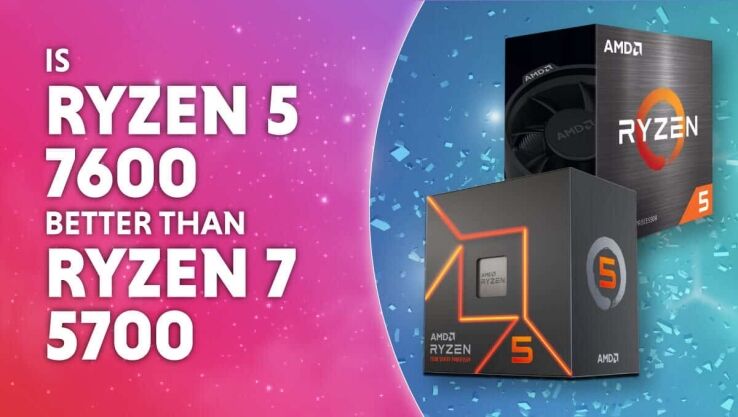Is Ryzen 5 7600 better than Ryzen 7 5700?
Is Ryzen 5 7600 better than Ryzen 7 5700? Let's find out

WePC is reader-supported. When you buy through links on our site, we may earn an affiliate commission. Prices subject to change. Learn more
The AMD Ryzen 5 7600 is a powerful gaming processor based on AMD’s latest Zen 4 architecture. The Ryzen 7 5700, on the other hand, is an older Zen 3 processor but has the innate advantage of belonging to the stronger Ryzen 7 series. Today, we’re finding out how the two compare.
Now Read: Best CPU for gaming
Is Ryzen 5 7600 better than Ryzen 7 5700? Let’s find out.
AMD Ryzen 5 7600 vs. Ryzen 7 5700 – CPU specs
First, a look at the official specs for both processors.
AMD Ryzen 5 7600 (Non-X)
Cores
6
Threads
12
Base speed
4.7GHz
Boost speed
5.3GHz
Cache
L3 32MB
Socket
AM5
Ryzen 5 7600
- Architecture: Zen 4
- Cores: 6
- Threads: 12
- Base Clock: 3.8GHz
- Boost Clock: 5.1GHz
- L3 cache: 32MB
- TDP 65W
AMD Ryzen 7 5700G
Speed
3.8GHz – 4.6GHz
Core (threads)
8 (16)
Socket
AM4
Graphics
Vega 8
Ryzen 7 5700
- Architecture: Zen 3
- Cores: 8
- Threads: 16
- Base Clock: 3.7 GHz
- Boost Clock: 4.6 GHz
- L3 Cache: 16MB
- TDP: 65W
The standard edition Ryzen 7 5700 is a super rare processor that you’ll really only find in prebuilt systems. To be clear, this CPU is different from the 5700G and 5700X released in 2021. The no-suffix R7 5700 was first introduced to us in Q3, 2022.
How does the Ryzen 5 7600 compare to the Ryzen 7 5700?
The two processors differ quite significantly in their architecture, core clock, core count, and L3 cache size.
AMD claims that it’s Zen 4 architecture affords processors a 14% higher IPC (Instructions per cycle) than their Zen 3 counterparts, resulting in the new 7000 processors having a performance boost just by being on the newer platform.
The R5 7600 comes out ahead in clock speeds, with a 5.1GHz max clock compared to the 5700’s 4.6GHz max clock. This is a significant 500MHz difference. The 7600 also has double the cache of the 5700.
The only advantage for the 5700 is that it has 2 cores and 4 threads more than the 7600.
Let’s see how these differences influence their performance.
Performance
As you would expect, the R5 7600 comes out ahead in single-core performance by a mile. The 500MHz clock speed difference coupled with the 14% Zen 4 IPC boost presents too large of a gap for the 5700 to bridge.
After aggregating results from various benchmarks, we see that the R5 7600 is about 20% faster than the 5700 in single-core performance.
The higher single-core performance means the 7600 is by far the better gaming processor since you get more in-game FPS in CPU-bound scenarios. In fact, the 7600 is probably the best gaming processor in its price bracket, solely due to its out-of-ordinary single-core performance. Here’s a dedicated Ryzen 5 7600 review if you’re interested in learning more.
In multicore performance, the two processors are much more even, with the 7600 still coming out ahead by a slight margin despite its fewer cores and threads. Makes sense, though, since each of the 7600’s 12 threads is much faster than each of the 5700’s 16 threads.
Power usage and thermals
Both processors have the same 65-watt TDP and come with an AMD wraith stealth cooler which is plenty to dissipate their generated heat.
The 7600 is slightly more power efficient due to its higher performance. But there’s not a remarkable difference in this category.
Price and value
The 7600 launched at $229 and has retained its original price, for the most part. The 5700 – well, you can’t really find it online, other than certain prebuilds.
The no-suffix 5700 is essentially a 5700G without the iGPU and with a 100MHz lower base clock (this matters very little, though, since the boost clock is identical.)
The 5700G had an MSRP of $359 and is available these days for just under $200.
Is Ryzen 5 7600 better than Ryzen 7 5700? Final Verdict
Performance-wise, the Ryzen 5 7600 is clearly better, with a significant lead in single-core performance and a slight lead in multicore performance. The 7600 is also better in terms of value, as for only about $30 more, you get a newer, faster, and more future-proof processor featuring AMD’s latest technologies.
The two processors are equally good options in terms of value if you’re looking for a workstation processor. But if that is indeed the case, you would be better served by a 10-core, 16-thread Intel Core i5-13400 at the same price.